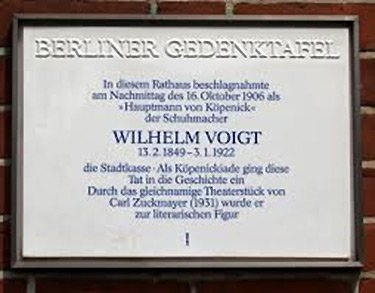Michael Burden had the answer on Quora.
The elderly Prussian army captain marched smartly up to a platoon of soldiers on a Berlin street and began to bark orders imperiously. He stopped a bus bound for the outlying Kopenick district and hustled the men abroad. There, as shown in the picture below, he marched them briskly to the office of Kopenick’s mayor and snapped: “You are under arrest !†Intimidated by the authoritative overbearing manner of the army officer, the mayor managed to ask timidly “Where is your warrant ?†“My warrant†roared the captain “is the men I command.†The mayor, himself a reserve officer, was curious about the captain’s appearance at the time, but he kept his curiosity to himself. The captain then ordered the borough treasurer to hand over all of the cash in the treasury, just over 4,000 marks, and issued an “official†receipt. The mayor, his wife, the treasurer and the deputy mayor were then marched outside the town hall and held under guard. The captain ordered his men to stay at their posts for half an hour and marched away with the 4,000 marks.
The captain was in fact Wilhelm Voigt, a cobbler and ex-convict who had exploited the Prussian awe of uniformed authority to rob Kopenick of its petty cash in October 1906. Ten days later, when the police arrived at Voigt’s attic home, they found the uniform wrapped in a bundle. He did not resist arrest but asked only to be allowed to finish his breakfast. Voigt, who explained that he had learnt to mimic the speech and mannerisms of Prussian officers while mending their boots as an apprentice, was jailed for four years.
His exploits had attracted great public sympathy and affection, however, and he was pardoned by the Kaiser after serving half his sentence. Voigt retired in comfort to Luxembourg on a life pension, given to him by a rich Berlin dowager who had been impressed by his sheer audacity.







GoneWithTheWind
In the 60’s I spent four years stationed in Germany. Worked in a shop with mostly GI’s and about 12 German civilians. The Germans had a contractual right to a break at 0900 and 1500 and a right to a bottle of beer at each break. The break room was just a small area with a shoulder high partition around it. You would swear they were in there fighting/arguing or planning a revolt. Between themselves it seemed impossible to talk in normal tones. They loved American swear words and with their guttural speech they would spit out the swearing like you might if you were trying to get another drunk to fight you. One of their favorite phrases was “What is this fuCKing SHitz” with spittle at the end. After you got to know them and learned a little German they were really nice guys and they were usually arguing over soccer or about cars and not planning WW III.
JK Brown
If only this observation from a century ago were still true:
“One must not be misled by the generality of the phrase used in chapter 39 [Magna Carta], and think it unimportant because it looks simple. It is hard for an American or Englishman to get a fresh mind on these matters. We all grow up with the notion that nobody has the right to arrest us, nobody has the right to deprive us of our liberty, even for an hour. If anybody, be he President of the United States or be he a police officer, chooses to lay his hand on our shoulder or attempts to confine us, we have the same right to try him, if he makes a mistake, as if he were a mere trespasser; and that applies just as much to the highest authority, to the president, to the general of the army, to the governor, as it does to a tramp. But one cannot be too often reminded that this principle is peculiar to English and American civilization. Throughout the Continent any official, any judge. anybody “who has a red band around his cap’ who, in any indirect way, represents the state — a railway conductor, a spy, a station agent — not only has the right to deprive you of your freedom, but you have no right to question him; the “red band around the cap” is a final answer.
“Hence that extraordinary incident, at which all England laughed, the Kupenick robbery. A certain crook who had been a soldier and was familiar with the drill and the passwords, obtained possession of an old captain’s uniform, walked into a provincial town of some importance, ordered the first company of soldiers he met to follow him, and then with that retinue, appeared before the town hall and demanded of the mayor the keys of the treasury. These were surrendered without question and he escaped with the money, representing, of course, that he had orders from the Imperial government It never occurred to any one to question a soldier in full uniform, and it was only some days later, when the town accounts were sent to Berlin to be approved, that the robbery was discovered.
“Such a thing could by no possibility have happened in England or with us; the town treasurer would at once have demanded his authority, his order from the civil authorities; the uniform would have failed to impress him.”
–Popular Law-making: A Study of the Origin, History, and Present Tendencies of Law-making by Statute, Frederic Jesup Stimson (1910)
Instead, America has become so very European. To quote Trump, it’s sad.
Please Leave a Comment!